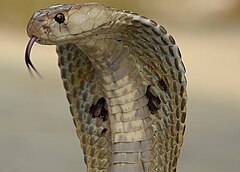Burmese pythons were introduced to the Everglades through the exotic pet trade. Many people buy these snakes as a cool pet, and when they outgrow their cages (like this monster to the right) they are set free. The Everglades and other natural areas around it are prime habitat for burmese pythons, originally from Southern and Southeast Asia, thus the rapid invasion.
Now, wildlife officials, overwhelmed and exhausted, are looking for solutions. The only way to deal with a harmful invasive species is to eradicate it. Because there are more wildlife issues than just hunting pythons, they've turned the issue over to the public. Florida's Fish and Wildlife Service will be hosting a python hunting contest. To test it out, it will only take place for a month, starting January 2013.
At first, it sounds like a reasonable solution. Why not let enthusiastic reptile hunters loose on the problem?
Here are some logistics:
- Cash prizes for the contestant who hunts the largest python, and for the one who hunts the most pythons.
- Contestants over 18 do not need a hunting license.
- Training before the hunt consists of a 25 minute PowerPoint presentation.
- Snakes are only to be killed in a humane way and in marked zones.
Seem reasonable? Well, I'm concerned. I'm concerned that native species of snakes will be killed at a high rate because they are mistaken to be young pythons. I'm concerned that someone is going to get tagged by an Eastern Diamondback or get hurt some other way. I'm concerned this small experiment will turn into a desperate attempt at some cash.
Example: Ever heard of the term "cobra effect"? Here's where it comes from:
Origin
The term cobra effect stems from an anecdote set at the time of British rule of colonial India. The British government was concerned about the number of venomous cobra snakes in Delhi.[3] The government therefore offered a bounty for every dead cobra. Initially this was a successful strategy as large numbers of snakes were killed for the reward. Eventually, however, enterprising persons began to breed cobras for the income. When the government became aware of this, the reward program was scrapped, causing the cobra breeders to set the worthless snakes free. As a result, the wild cobra population further increased. The apparent solution for the problem made the situation even worse.[2][4]
A similar incident occurred in Hanoi, Vietnam, under French colonial rule. The colonial regime created a bounty program that paid a reward for eachrat killed.[3] To obtain the bounty, people would provide the severed rat tail. Colonial officials, however, began noticing rats in Hanoi with no tails. The Vietnamese rat catchers would capture rats, lop off their tails, and then release them back into the sewers so that they could procreate and produce more rats, thereby increasing the rat catchers' revenue.[5]
But who knows. Maybe it'll work out. Maybe whatever possible harms will show themselves within the first month and Florida will learn quickly that it's a bad idea. Or MAYBE everyone will take their training seriously, abide by the rules, and no person or animal will be hurt. In my experience, this doesn't happen often, but for the sake of the Everglades and all the wonders it stores for us, I sure hope it all works out.


0 comments:
Post a Comment